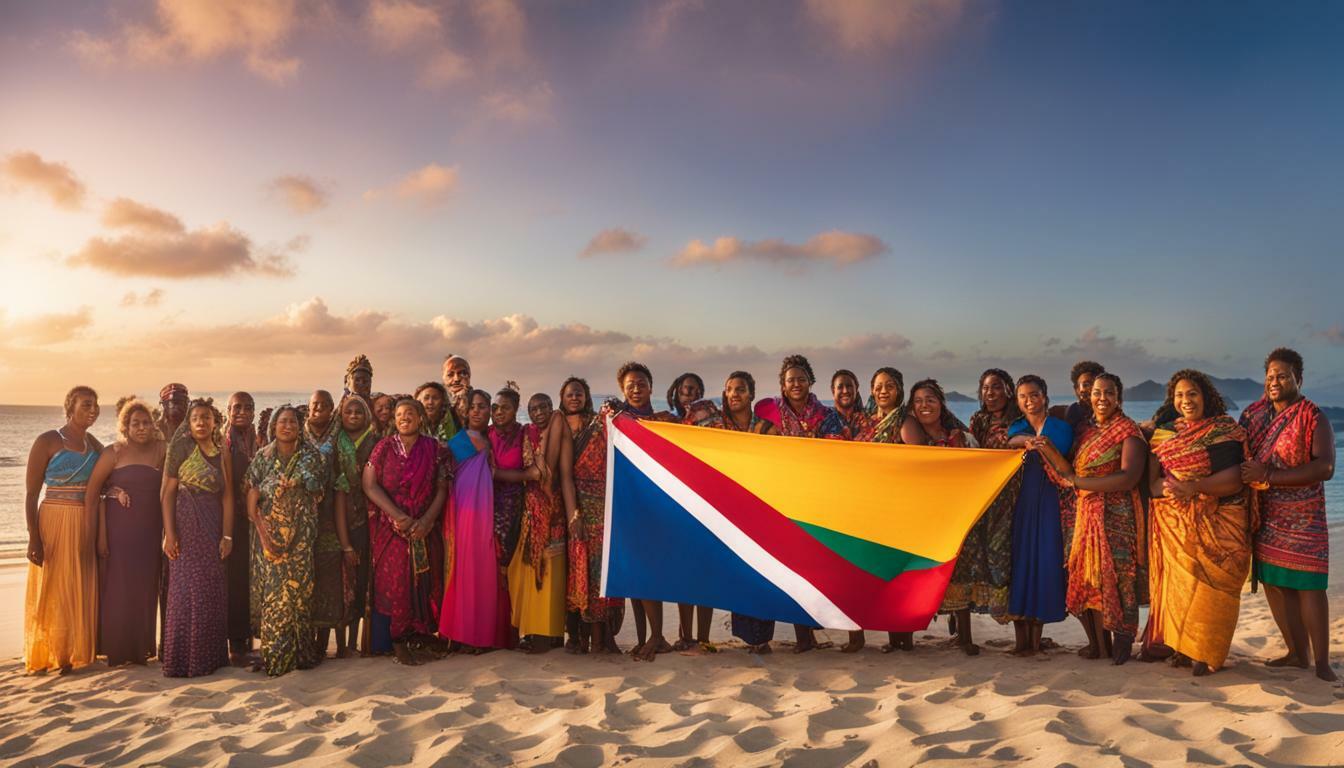Fiji is a culturally diverse country with three official languages spoken by its inhabitants. The indigenous Fijians primarily speak Fijian, while the Indo-Fijians mainly communicate in Fiji Hindi. English serves as a common language for government, business, and education in Fiji. Additionally, various other languages, such as Chinese, Rotuman, Arabic, Urdu, Tamil, Telugu, Punjabi, Cantonese, Mandarin, Gilbertese, Tongan, and Micronesian and Polynesian languages, contribute to the linguistic tapestry of the nation.
Key Takeaways:
- Fiji has three official languages: Fijian, Fiji Hindi, and English.
- Fijian is predominantly spoken by the indigenous Fijian population.
- Fiji Hindi is primarily used by the Indo-Fijian community.
- English is widely used in government, business, and education.
- Fiji is home to a rich variety of other languages, reflecting its diverse cultural makeup.
The Official Languages of Fiji
The official languages of Fiji reflect the diverse cultural heritage of the country. Fiji is a multilingual nation with three official languages: Fijian, Fiji Hindi, and English. The majority of indigenous Fijians speak Fijian as their first language, while Indo-Fijians mainly speak Fiji Hindi, which is a fascinating fusion of Awadhi, Bhojpuri, and Hindi-Urdu. English, as a widely spoken language, serves as a lingua franca in government, business, and education sectors, facilitating communication between different ethnic groups and expatriates.
Fijian Language
Fijian, the indigenous language of the Fijian people, holds great cultural significance. It is spoken by the iTaukei, the indigenous community of Fiji, and is known for its rich vocabulary and unique grammatical structure. Fijian language spreads beyond the boundaries of Fiji, extending to other Pacific Island nations. Fijian place names can have confusing pronunciations, reflecting the intricacies of the language and its connection to the land.
Fiji Hindi
Fiji Hindi is predominantly spoken by the Indo-Fijian population, who are descendants of indentured laborers from the Indian subcontinent. It evolved over generations in Fiji, blending various dialects and languages from North India. Fiji Hindi plays a vital role in preserving the cultural heritage of Indo-Fijians and serves as a means of communication within their community.
The linguistic diversity of Fiji extends beyond its official languages. There are numerous other languages spoken in the country, including Chinese, Rotuman, Arabic, Urdu, Tamil, Telugu, Punjabi, Cantonese, Mandarin, Gilbertese, Tongan, as well as various Micronesian and Polynesian languages. This rich tapestry of languages reflects the vibrant multiculturalism present in Fiji.
Visiting Fiji offers a chance to witness the beauty of language diversity and experience the warmth and hospitality of its people. Whether you’re exploring the intriguing Fijian language, engaging with the Indo-Fijian community through Fiji Hindi, or conversing in English with locals, language is an integral part of Fiji’s cultural fabric.
| Official Languages of Fiji | Indigenous Languages of Fiji |
|---|---|
| Fijian | Fijian |
| Fiji Hindi | |
| English |
Fijian Language
The Fijian language holds significant cultural and historical value as the native language of the indigenous Fijians. It is deeply rooted in the traditions and identity of the Fijian people, serving as a means of communication and a reflection of their rich heritage. Fijian, also known as i-taukei, is one of the three official languages of Fiji, alongside Fiji Hindi and English.
With intricate grammar and a melodic cadence, the Fijian language encapsulates the nuances of Fijian culture. It is a language that celebrates community and connection, with specific vocabulary and linguistic features reflecting the unique Fijian way of life. Fijian place names, for example, can have confusing pronunciations for non-speakers, adding to the charm and complexity of the language.
While English is widely used in Fiji for official and business purposes, the preservation and promotion of the Fijian language remain crucial. Efforts are being made to ensure that future generations continue to embrace their linguistic heritage. Schools across the country offer Fijian language classes, and there are initiatives to document and archive traditional stories, songs, and chants in Fijian.
Fijian Language Example Table
| Fijian Word/Phrase | English Translation |
|---|---|
| Bula | Hello |
| Vinaka | Thank you |
| Moce | Goodbye |
| Noqu | Mine |
“The preservation of the Fijian language is essential for the continued vibrancy of Fijian culture. It is through our language that we express our traditions, stories, and values, passing them down to future generations. It is a language that holds our history and identity, connecting us to our land and ancestors.” – Baqe, Fijian Elder
The Fijian language is a testament to the diversity and linguistic richness of Fiji. As Fijians continue to uphold and celebrate their native language, it is a testament to their deep-rooted pride and resilience as a people.
Fiji Hindi: A Linguistic Blend
Fiji Hindi, a unique blend of Awadh, Bhojpuri, and Hindi-Urdu, is widely spoken among the Indo-Fijian community in Fiji. It is a testament to the rich cultural heritage brought by Indian immigrants to the islands. With its roots in northern India, Fiji Hindi evolved as a language of communication among the indentured laborers who came to Fiji during the late 19th and early 20th centuries.
Characterized by its melodic intonation and distinct vocabulary, Fiji Hindi is a vibrant language that reflects the diverse linguistic influences of its speakers. It contains elements of Awadh, a dialect spoken in the northern Indian state of Uttar Pradesh, as well as Bhojpuri, a language spoken in the Indian states of Bihar, Jharkhand, and Uttar Pradesh. Furthermore, Fiji Hindi incorporates words and phrases from Urdu and Hindi, making it a linguistic blend that is uniquely tailored to the Indo-Fijian community.
A Language of Heritage and Identity
Fiji Hindi not only serves as a means of communication but also plays a significant role in preserving the cultural identity of Indo-Fijians. Through the language, individuals are able to express their traditions, values, and stories, ensuring that their rich heritage is passed down through generations. It serves as a vital link to their ancestral roots and fosters a strong sense of belonging within the community.
Despite the cultural significance of Fiji Hindi, it is important to note that English and Fijian are also widely spoken in Fiji. English, as the lingua franca, facilitates communication across different ethnicities and is utilized in government, business, and education. Fijian, being the indigenous language of the country, holds a special place among the indigenous Fijian population, serving as a symbol of cultural pride and heritage.
| Languages spoken in Fiji | Main Ethnic Group |
|---|---|
| Fijian | Indigenous Fijians |
| Fiji Hindi | Indo-Fijians |
| English | General Population |
| Chinese, Rotuman, Arabic, Urdu, Tamil, Telugu, Punjabi, Cantonese, Mandarin, Gilbertese, Tongan, Micronesian, Polynesian languages | Various Ethnic Communities |
In a country as culturally diverse as Fiji, the multitude of languages spoken reflects the rich tapestry of its people. From Chinese to Arabic, Tamil to Tongan, these languages contribute to the vibrant multicultural fabric of the nation, creating a harmonious blend of traditions, customs, and languages.
In conclusion, Fiji Hindi holds a significant place among the Indo-Fijian community, serving as a linguistic bridge that connects them to their heritage. Alongside Fijian and English, it forms part of the rich linguistic landscape of Fiji, where diversity is celebrated and languages are valued for their ability to preserve and express culture.
English Language in Fiji
English serves as a common language for communication and plays a vital role in various aspects of life in Fiji. As one of the three official languages, it is widely used in government proceedings, business transactions, and educational institutions throughout the country. English proficiency is seen as essential for individuals seeking career opportunities and academic success in Fiji.
While English is spoken by a significant portion of the population, it is important to note that there are variations in the English spoken in Fiji. The local dialect, known as Fijian English, incorporates unique vocabulary, pronunciation, and expressions influenced by the multicultural nature of the country.
In addition to being a means of communication, English also provides access to global knowledge and resources. Many educational materials, books, and online resources are available in English, enabling Fijians to stay connected and informed about international developments in various fields.
English Language Education in Fiji
In Fiji, English is taught as a subject in schools, starting from the early years. The curriculum focuses on developing language skills, including reading, writing, listening, and speaking. English proficiency exams are also conducted to assess students’ language abilities. Those with strong English skills have better opportunities for higher education and employment prospects.
| English Language in Fiji | Languages Spoken in Fiji |
|---|---|
| Fijian English | Chinese |
| Fiji Hindi | Rotuman |
| Fijian | Arabic |
| English | Urdu |
| Tamil | |
| Telugu | |
| Punjabi | |
| Cantonese | |
| Mandarin | |
| Gilbertese | |
| Tongan | |
| Micronesian | |
| Polynesian |
The linguistic diversity in Fiji is enriched by the presence of numerous other languages spoken by different ethnic communities. People of Chinese, Rotuman, Arabic, Urdu, Tamil, Telugu, Punjabi, Cantonese, Mandarin, Gilbertese, Tongan, Micronesian, and Polynesian backgrounds all contribute to the multicultural fabric of Fiji, celebrating their unique languages and cultural heritage.
English, alongside Fijian and Fiji Hindi, helps to bridge the linguistic gaps and facilitates communication among the diverse groups of people who call Fiji home. The linguistic landscape of Fiji reflects the country’s rich cultural tapestry and the spirit of inclusivity that prevails within its borders.
Other Languages Spoken in Fiji
In addition to the official languages, Fiji is home to a rich tapestry of languages, reflecting the multicultural nature of the country. The diverse population of Fiji brings with it a multitude of languages from different regions of the world.
The Chinese language is spoken by a significant number of people in Fiji, particularly those of Chinese descent. Additionally, the Rotuman language, spoken by the indigenous people of Rotuma Island, carries a distinct cultural heritage. Other languages found in Fiji include Arabic, Urdu, Tamil, Telugu, Punjabi, Cantonese, Mandarin, Gilbertese, Tongan, as well as various Micronesian and Polynesian languages.
It is fascinating to witness the linguistic variety present in Fiji, as it adds depth to the cultural fabric of the nation. Different communities maintain their native languages, passing them down through generations, and fostering a sense of identity and belonging. This linguistic diversity is celebrated, and it contributes to the overall multicultural experience in Fiji.
| Language | Speakers | Significance |
|---|---|---|
| Chinese | Chinese community | Preservation of heritage |
| Rotuman | Rotuman people | Indigenous cultural identity |
| Arabic | Arab community | Religious and cultural expressions |
| Urdu | Pakistani community | Connection to ancestral roots |
These languages not only serve as a means of communication but also play a significant role in fostering cultural traditions, preserving heritage, and strengthening community bonds. While English, Fijian, and Fiji Hindi are the official languages, the presence of these other languages enriches the linguistic landscape of Fiji, making it a truly diverse and multicultural nation.
Conclusion
The linguistic diversity of Fiji exemplifies its vibrant multicultural society, with Fijian, Fiji Hindi, and English serving as the foundation for communication among its diverse communities.
Fiji, a beautiful island nation in the South Pacific, is home to three official languages: Fijian, Fiji Hindi, and English. Fijian, the indigenous language of the country, is primarily spoken by the indigenous Fijians. It reflects the rich cultural heritage and traditions of the Fijian people. Fiji Hindi, on the other hand, is predominantly spoken by the Indo-Fijian population, and is a unique blend of Awadhi, Bhojpuri, and Hindi-Urdu.
English, as a widely spoken language in Fiji, plays a crucial role in government, business, and education. It serves as a lingua franca, facilitating communication among the diverse communities in the country. The use of English in official settings has contributed to Fiji’s global integration and its ability to attract international investments.
In addition to the official languages, Fiji is also home to a wide range of other languages, such as Chinese, Rotuman, Arabic, Urdu, Tamil, Telugu, Punjabi, Cantonese, Mandarin, Gilbertese, Tongan, as well as various Micronesian and Polynesian languages. This linguistic diversity reflects the multicultural nature of Fiji and adds to the country’s cultural richness.
Exploring the linguistic landscape of Fiji reveals not only the importance of language diversity, but also its role in shaping the cultural fabric of the country. The diverse languages spoken in Fiji contribute to the sense of identity and belonging among its people, fostering cultural exchange and understanding. It is a testament to Fiji’s multicultural heritage and its commitment to embracing and celebrating its linguistic diversity.
FAQ
What languages are spoken in Fiji?
The main languages spoken in Fiji are English, Fijian, and Fiji Hindi. However, there are also several other languages spoken in the country, such as Chinese, Rotuman, Arabic, Urdu, Tamil, Telugu, Punjabi, Cantonese, Mandarin, Gilbertese, Tongan, and various Micronesian and Polynesian languages.
What is the official language of Fiji?
Fiji has three official languages: English, Fijian, and Fiji Hindi.
Which language do indigenous Fijians speak?
The majority of indigenous Fijians speak Fijian as their first language. Fijian is the native language of the indigenous Fijian population.
What is Fiji Hindi?
Fiji Hindi is mainly spoken by the Indo-Fijian population in Fiji. It is a mixture of Awadhi, Bhojpuri, and Hindi-Urdu.
How widely is English used in Fiji?
English is widely used in Fiji, particularly in government, business, and education. It serves as a lingua franca in the country.
Are Fijian place names difficult to pronounce?
Yes, Fijian place names can have confusing pronunciations. It is important to be aware of the variations in the English language spoken in Fiji.


